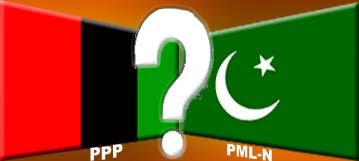Pakistan begins presidential poll process
 Islamabad- The campaign for next month's presidential race in Pakistan kicked off on Tuesday with three major players filing their nominations as the power struggle intensified, threatening the internal security of the country.
Islamabad- The campaign for next month's presidential race in Pakistan kicked off on Tuesday with three major players filing their nominations as the power struggle intensified, threatening the internal security of the country.
Dozens of party workers gathered outside the Election Commission of Pakistan as Asif Ali Zardari, the widower of former prime minister Benazir Bhutto, who has headed her Pakistan peoples Party (PPP) since she was assassinated late last year in the garrison city of Rawalpindi, submitted his nomination papers.
"We believe that Mr Zardari is the right candidate for this office because he truly represented the unity of federations," Law Minister Farooq Naek.
But Zardari's major coalition partner and head of the second largest Pakistan Muslim League-Nawaz (PML-N), Nawaz Sharif accused him on Monday of breaking the promise of restoration of more than 60 judges immediately after the removal of former president Pervez Musharraf. Sharif's accusation came as he announced he was pulling out of the ruling coalition of the two parties.
The alliance of the two parties was formed after the PPP and PML-N trounced the political allies of Musharraf in the February 18 general elections.
Sharif also said he would field what he called a "non-partisan" presidential candidate, retired chief justice Saeeduz Zaman Siddiqui, to run against Zardari in the presidential polls to be held on September 6.
"An independent judiciary forms the backbone of the democratic system in the country. And, God willing, if I win, this will be my first priority," Siddiqui said as he submitted his papers.
The third candidate is from Musharraf's former allies Pakistan Muslim League-Quaid (PML-Q). The former editor of a daily English- language newspaper and has a doctorate in propaganda, Mushahid Hussain, said his party's "stance is that the candidate should be a symbol of federation not disintegration."
"I have challenged Mr Zardari to come forward and present his vision before the nation," he added.
The right-wing PML-N and left-wing PPP remained united until they brought down their common foe Musharraf last Monday. But since then they have been engaged in bickering over reinstatement of judges and who will be the next president.
Sharif insisted on immediate restoration of more than 60 judges, including deposed Supreme Court chief justice Iftikhar Chaudhry, but Zardari remained reluctant fearing that independent-minded judges could annul a controversial amnesty granted to him by Musharraf over charges of embezzlement of state funds and receiving kick-backs of millions of dollars.
The collapse of the coalition could lead to a traditional power struggle between the country's two major parties. PML-N can try to topple the PPP-led government at the centre if it manages to get support from PML-Q, which is comprised mainly of the MPS which defected his party back in 2000s under pressure from Musharraf.
The PPP, on the other hand, could try to bring down the PML-N's government in the country's largest and richest province Punjab.
But there are few chances that Zardari might not get the majority vote of 352 in the 702-presidential electoral college, which is composed of four provincial assemblies and the two houses of the parliament - the lower house National Assembly and upper house Senate.
He has secured the support of two ethnic parties Muttahida Qaumi Movement (MQM) and Awami National party (ANP) and some independent candidates.
But the conflict between the two major parties has put aside several major issues, including the fight against terrorism. More than 4,000 people have died in suicide attacks by pro-Taliban militants across the country in 2007 and 2008.
"The worst part in this complete mess unleashed by the break-up of coalition is that the hydra of militancy and terrorism may well be relegated further down the government's list of priorities - since it will be fighting not for the survival of its citizens but for its own," said the English-language daily The News. (dpa)